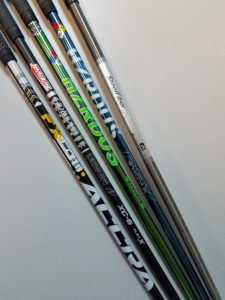
Cink and Ko Shafts 2021
In our fittings, we know the the right shafts make a difference for every club in your bag. The golf shaft is the transmission that transmits the energy from your swing through the shaft to the club head.
Our fitting systems make the correct recommendations for club length, shaft weight, shaft flex, trajectory, spin and swing weight based upon YOUR swing characteristics. The way we fit shafts is very similar to every tour from PGA, Champions, LPGA to Korn Ferry. Take a look at what PGA Champion Stewart Cink and LPGA Champion Lydia Ko had in their bags on Sunday! See GolfWrx WITB.
Book Your Fitting TODAY!
Shaft Weight
The lightest, longest, stiffest shaft in your bag is in your driver, while the heaviest yet softest shafts are in your wedges. In general, for most golfers there is a 10 gram progression from driver shaft to fairways, hybrids, and irons. So, if you play a 60 – 69 gram shaft in your driver you would play a 70 – 79 gram shaft in your fairway woods, an 80 – 89 gram shaft in your hybrid a 90 – 99 gram shaft in your irons and maybe a 100 – 110 gram shaft in your sand and lob wedge. Stronger players will see maybe a larger differential while slower swings will see very little weight differential. The reason for this changing weight is that as clubs get shorter the added shaft weight helps balance the feel of the club. Also, do not believe that lighter shafts create faster swing speeds. In most cases, the opposite occurs.
Getting the Right Driver Shaft
Graphite or Steel in Your Irons?
Shaft Length
We start our recommendations with lengths based on wrist-crease-to-floor measurement. This is fairly universal however every golfer has a different posture that may dictate longer or shorter club lengths. We also believe that driver lengths are too long causing golfers to hit the ball on the heel and lose distance and accuracy. Our recommendations are slightly shorter than what you will find stock in most off-the-rack drivers. Length and shaft weight go together to give you the feel you need for a consistent swing from long clubs to shorter clubs.
Should YOU Play a Longer Driver?
Shaft Flex
Our shaft flex recommendations are based upon a combination of distance you hit your clubs (swing speed), tempo, transition and release. In general, golfers that hit longer distances with faster tempo, fast transition and late release will require heavier, stiffer shafts. Smooth “swingers” versus fast “hitters” can play softer lighter flexes. Also, longer clubs should play 1 to 1.5 flexes stiffer than shorter clubs. So, if your driver is S(6.0), your irons should probably be R(5.0), etc. Some golfers swing harder with their drivers so they may need stronger flexes in their longer clubs. In general butt stiffness, or flex has a significant role in shot direction. Too stiff and you may fade/slice or pull your shots. Too flexible and your shots will be inconsistent in both direction and height. We Frequency Match all of our club builds so that you can rest assured you are getting a proper flex based upon shaft characteristics.
Shaft Flex and How We Build Your Clubs
Trajectory and Spin
The wrong shaft can have a significant impact on trajectory and spin which affects both distance AND accuracy. There are thousands of shafts in the after-market that can have a dramatic affect on your distance and accuracy. We profile every shaft we put in our fitting system so we understand the static measurements and how that may affect ball flight. Then, we have several members of our team and customers test shafts to see the results based upon their swing characteristics. Bottom line is that the proper shaft can optimize your distance, accuracy and consistency. For drivers you want the highest launch that optimizes carry AND roll out with the lowest spin possible. For irons, you want the best landing angle into the green so that you do not run through the green or back the ball off the green.
Understanding Shaft Trajectory and Spin
Swing Weight
In our recommendations, swing weight is a measure of “feel” of the club. Too light and you will not know where the club head is in your swing. Too heavy and you will feel like you have to work to get your club to the ball consistently. The right swing weight can help make every club in your bag feel consistent so you can create an effortless swing. In general, faster transitions with high swing speeds will dictate heavier swing weights while smooth transitions with slower swing speed will like lighter swing weights. Swing weights are dramatically affected by shaft weight, length and grip weight, so consult your fitter to determine what works for YOUR swing.
Swing Dynamics That Affect Shaft Selection
Book Your Fitting TODAY!
Dan Sueltz
